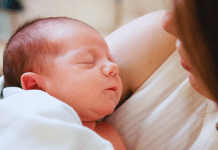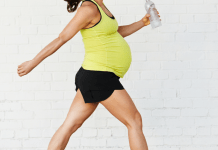We are continuing our series with Board Certified Lactation Consultant (and Scottsdale mom/grandma!) Andrea Mansor, who answers Scottsdale Moms Blog readers’ breastfeeding questions once a month. You can read previous Q & A posts with “Dear Andi” here.
This time around Andrea is talking about nursing when baby has teeth (ouch!) and what to do when baby has a better latch on one breast than the other. If you have a question you’d like Andrea to answer, leave it in the comments below!
******************************************************************************
Dear Andi,
From the beginning my baby had a hard time latching on my left breast. In result of that, my left nipple is very sensitive, cracked and scabbed. Any tips?
Tammy
Tammy, breastfeeding can most definitely be challenging when your nipples are sore or broken down. While tenderness may be common, cracking, blistering and pain that is not relieved shortly after latching is not normal. It should not hurt to breastfeed!
Babies are generally most eager to feed on the first side so you may try breastfeeding on your least sore breast first and switch to the sore breast after your milk has begun to let down. One of the most common reasons for sore nipples is an incorrect or shallow latch. You may benefit from assistance from a lactation consultant to see if your baby is latching deeply. Start the latch with your nipple slightly above your baby’s upper lip and pointed to the roof of her mouth. Wait for her to open her mouth very wide before latching her on. It is important that when your baby latches, her chin is in contact with the breast and her bottom lip is positioned well below your nipple so her tongue can extend deeper into the breast tissue. Changing your baby’s position may alleviate pressure on the sore area of the nipple and may help baby to latch deeper.
After feeding, allow your milk to air dry on your nipple. Breastmilk has properties that will help your nipple to heal. Apply pure lanolin after to provide moist wound healing. You can protect your nipple between feedings by using Hydrogel pads or breast shells (hard plastic shells with air holes worn inside your bra).
For some mothers, the pain of a cracked nipple can prevent them from persevering in their goal to breastfeed. If your nipple is too badly damaged to tolerate a feeding you may need to pump that breast and offer your expressed breast milk by bottle until your nipple is healed. For pain and nipple breakdown that does not heal it would be helpful to contact a professional lactation consultant who can observe a feeding and give you some hands-on latch assist.
Dear Andi,
I have a two-month-old and plan to give her breastmilk for up to 18 months if I can, but I am so nervous about when she starts teething. I know it can be done but are there any tried and true ways to prevent/discourage biting?
Farzana
Having breastfed four babies myself, I understand your concern, Farzana. Many breastfeeding moms become nervous when baby starts to teethe so you are not alone. But babies do continue breastfeeding way beyond when they cut their first teeth.
As your baby begins to teethe, his gums may become tender and biting down makes baby’s gums feel better. Offer him something cold to chew on before breastfeeding to help numb his gums. You can also gently massage his gums prior to feeding. I would not use any numbing gels or ointments as these may affect baby’s ability to suck and swallow correctly.
Some babies become impatient if they are hungry and mother’s milk has not let down. Baby may chomp down on the breast out of frustration. Try massaging your breast prior to latch and then compressing your breast while baby is feeding to help move milk down through the ducts. Biting is often accidental. Babies sometimes bite down toward the end of a feeding when they become sleepy and the breast begins to slide out of their mouths. Hold baby close throughout the feeding and if he is becoming sleepy and not maintaining a strong, rhythmic sucking pattern, break the suction and take him off the breast. Try relatching when he is more awake.
I will not promise your baby won’t ever bite you but your startled reaction when he does may puzzle or frighten him and that may be enough to convince him not to bite again.
Do you have breastfeeding questions for Andrea (Andi)? Leave your questions in the comments below. We can’t promise that every one will get answered, but we’ll add them to our list for future Dear Andi posts.
******************************************************************************
 Andrea Mansor has been assisting mothers and babies with breastfeeding for 15 years, first as an RN working in Obstetrics then as a Board Certified Lactation Consultant since the year 2000. She and her husband George have lived in the Valley for more than 30 years and raised their family in the same Scottsdale home since 1985. The mother of four grown children and grandmother of two (with two more on the way!) Andrea finds immense satisfaction in helping young mothers. She has facilitated a new mom/baby support group for the past 8 years. Andrea encourages mothers to ‘get to know their babies’ and ‘be in the moment’ as they navigate the challenges of motherhood and breastfeeding.
Andrea Mansor has been assisting mothers and babies with breastfeeding for 15 years, first as an RN working in Obstetrics then as a Board Certified Lactation Consultant since the year 2000. She and her husband George have lived in the Valley for more than 30 years and raised their family in the same Scottsdale home since 1985. The mother of four grown children and grandmother of two (with two more on the way!) Andrea finds immense satisfaction in helping young mothers. She has facilitated a new mom/baby support group for the past 8 years. Andrea encourages mothers to ‘get to know their babies’ and ‘be in the moment’ as they navigate the challenges of motherhood and breastfeeding.


















